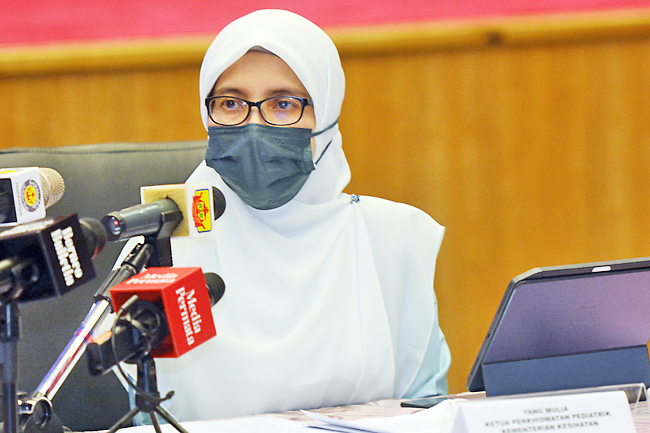Rokiah Mahmud
The COVID-19 Vaccination Programme is hoped to protect children below 12, especially those with different abilities as infection can lead to serious and severe impacts compared to other children.
This was stated by Paediatric Cardiologist Consultant and Head of Paediatric Services at the Ministry of Health (MoH) Dr Hajah Rohayati binti Haji Mohd Taib during the special press conference on vaccination for children aged five to 11 yesterday.
Dr Hajah Rohayati explained that two children with different abilities were admitted to categories 4 and 5 during the outbreak’s third wave.
“This is why we emphasise on vaccination for this category of children,” she said.
Asked on the children’s immune response compared to those aged 16-25, Dr Hajah Rohayati said that only one third of the vaccine will be administered to those under 12.
“Pfizer has carried out clinical trials involving thousands of children, looking at their immune and antibody response. Unlike adults, children below 12 will only be given 10 microgrammes of COVID-19 vaccine, while those above 16 years receive 30 microgrammes,” she said, adding that children in the age category have a robust immune system enabling their bodies to fight the virus alongside the vaccine.

Children with comorbidities such as immune problems, allergies, obesity, neurologic problem and chronic heart diseases will be prioritised to take the vaccine as the risks of infection among them is “seriously high”.
However, children who develop severe or allergic reactions from taking the vaccine will not be allowed to receive another dose, including those who developed myocarditis from the first dose of Pfizer, Dr Hajah Rohayati said.
Children with pneumonia, epilepsy and asthma are also categorised as high risk and will be prioritised for the vaccine.
For parents concerned about the vaccine’s side effects, she assured that the ministry has analysed the Pfizer vaccine trial, a real life data in which around 8.7 million doses have been administered to children aged five to 11.
“The result is very encouraging compared to the side effects or symptoms of those 12 years and above. The side effects (for children aged five to 11) will be milder. The most common side effects include pain (six out of 10), irritation and swelling which goes away after one to two days, and muscle pain,” Dr Hajah Rohayati said, adding that children in the age group has a 10 per cent chance of developing fever.
“Alhamdulillah, all the data has been encouraging and should ease parents’ concerns,” she said.



















































